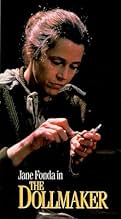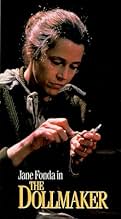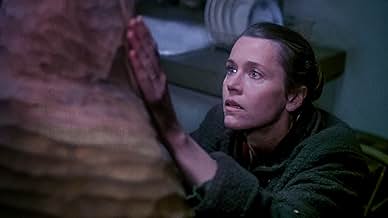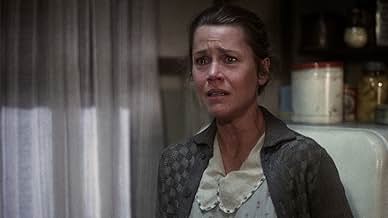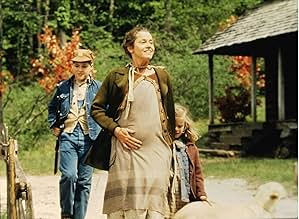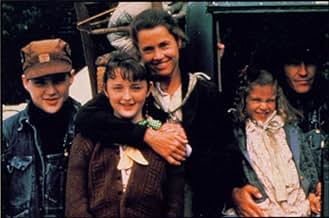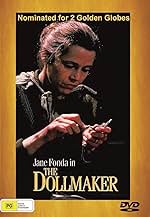The Dollmaker
- Película de TV
- 1984
- 2h 22min
CALIFICACIÓN DE IMDb
7.5/10
1.1 k
TU CALIFICACIÓN
Agrega una trama en tu idiomaDuring WWII, a hard-luck farmer leaves rural home for a big city factory job. Gertie, his woodcarver wife reluctantly joins. City life and reckless spending leave them in dire straits, so Ge... Leer todoDuring WWII, a hard-luck farmer leaves rural home for a big city factory job. Gertie, his woodcarver wife reluctantly joins. City life and reckless spending leave them in dire straits, so Gertie carves handmade dolls to support her family.During WWII, a hard-luck farmer leaves rural home for a big city factory job. Gertie, his woodcarver wife reluctantly joins. City life and reckless spending leave them in dire straits, so Gertie carves handmade dolls to support her family.
- Ganó 2 premios Primetime Emmy
- 5 premios ganados y 7 nominaciones en total
Robert Swan
- Victor
- (as Bob Swan)
- Dirección
- Guionistas
- Todo el elenco y el equipo
- Producción, taquilla y más en IMDbPro
Argumento
¿Sabías que…?
- TriviaMovie stars Jessica Lange, Sissy Spacek and Jane Fonda were all in 1985 invited to testify before the House Democrats' Farm Task Force dealing with the emotional toll of the financial stress experienced by farmers in the early 1980's. The three actresses were invited to this Capitol Hill meeting due to their lead film performances as troubled farmers from each of their then current farm films from that era. The pictures were, respectively, Country (1984), Río violento (1984) and The Dollmaker (1984). Another farming picture at this time was En un lugar del corazón (1984) which starred Sally Field but she did not attend the hearings.
- ConexionesFeatured in The 36th Annual Primetime Emmy Awards (1984)
Opinión destacada
This extremely powerful film features one of the strongest and best performances by Jane Fonda, as a Kentucky share-cropper's wife struggling during the years 1944-5 both to liberate herself as a person and save her family from devastating and terrible hardship, which means no money and nothing to eat (a problem compounded by having five children to feed). The film is thoroughly authentic and is a rare example of the shallow trendies of Hollywood getting to grips with real life and genuinely provincial people. Jane Fonda portrays a heroic young woman with irrepressible fire and vigour, a kind of "Kentucky Mother Courage', and as the film progresses and she improves her speech patterns, her Kentucky accent gets closer and closer to the real thing. That in itself is a remarkable achievement, considering how few actors can ever manage it. Fonda's husband is played by Levon Helm, a genuine hick born in Arkansas, whose first acting role was in THE COAL MINER'S DAUGHTER (1980), which was also set in Kentucky. Helm needed no coaching to 'talk country', as he was born to it. All he had to do was fine-tune his Arkansas accent and shift it slightly into Kentucky mode. This film is based upon a novel by Harriette Simpson Arnow (1908-1986), who was born in Kentucky and intimately knew what she was writing about (she had also lived in Detroit, which is portrayed in the latter part of the film). I wondered why the Kentucky scenes did not really look like Kentucky, but the end credits explained that those scenes were shot in Tennessee. The setting is meant to be the foothills of the Cumberland Mountains of Appalachia in Kentucky, but only a pernickety person like myself would notice the difference, and that there are too many rivers and not enough trees, and a severe shortage of very steep hills. The Michigan scenes were also shot in Illinois. Oh well, never mind, it all works anyway. The wonderfully accurate use of language and turns of phrase present in the script were presumably all taken word for word from the novel, and it is a joy to see and hear this record for posterity of a now-vanishing speech which was a direct survival of the 17th century language of England and Northern Ireland ('Ulster') amongst the Kentucky country folk who describe themselves as the 'Scotch-Irish' because they are descended from the Protestant Scots who settled in Ulster in Elizabethan and Stuart times, as I partly am myself, and as by far the majority of the American presidents have been (such as Abraham Lincoln and Andrew Johnson, to name but two, Lincoln being a distant relation of mine by marriage only, through his stepmother Johnston). One especially good aspect of this film is the casting of the children, all of whom were chosen very carefully and are excellent. (Hollywood casting of children is often so very puke-making, isn't it?) The TV film was directed by Daniel Petrie (1920-2004), who directed 91 films in his career, mostly for television, but whose best known feature films for the cinema were A RAISIN IN THE SUN (1961) with Sidney Poitier and FORT APACHE THE BRONX with Paul Newman (1981). For TV he made films about Truman, Roosevelt, and Nixon, thus carving a presidential niche for himself. He was a Canadian, and it is not known how he came to make such a sensitive film about Kentucky country folk as this, having presumably never had experience of them. He was clearly a man of greater talent than is customarily recognised. The story of this film is based upon a common problem faced by women throughout history, namely that they sometimes marry men stupider than themselves. That is always a bad idea, because the woman and her children are then at the mercy of bad decisions made by someone who is essentially a fool, but who insists upon exerting authority in the household because it is his right as a superior male, and he has the muscle to back it up. Fonda's husband means well but he is just not very bright, and early in the tale, she is still frozen in the mould of the dutiful wife, enforced by threats from her overbearing mother (played by Geraldine Page), who would rather die than defy her husband in any way whatever and who insists that it is Fonda's duty to 'love honour and obey', with the emphasis on the obey. So the husband, without telling his wife, sneaks off to Detroit to become a factory worker for Mr. Flint (yes, Mr. Flint of Flint, Michigan) and earn lots of money (or so he imagines). Fonda is forced by her mother to follow her husband to the appalling environment where he is now living in a paper-thin shack in a row of what are essentially workers' barracks, and where the good salaries they earn are soon wasted on the higher prices paid to live and frittered away on surviving the endless strikes, so that after a lengthy period of misery they end up with nothing after all. As things get grimmer, Fonda is increasingly forced to develop a bit more self-confidence and start taking the initiative herself. She has always had a knack for 'country whittling' with wood, a habit indulged in by most mountain folk in Kentucky in those days. But her talent is greater than most, and she is discovered by an arts and crafts teacher and enabled to sell her carvings, especially her animals and dolls (hence the title of the film), which finally earns them enough money to get ahead, while all the husband's efforts have dismally failed. I shall not relate the end of the story, as that is against IMDb rules, but I urge everyone to see this remarkable film. If only there were more like it, and less money were wasted on worthless, insipid cinematic trivia.
- robert-temple-1
- 26 dic 2012
- Enlace permanente
Selecciones populares
Inicia sesión para calificar y agrega a la lista de videos para obtener recomendaciones personalizadas
Detalles
- Fecha de lanzamiento
- País de origen
- Idioma
- También se conoce como
- Dollmaker - Ein Traum wird wahr
- Locaciones de filmación
- Productoras
- Ver más créditos de la compañía en IMDbPro
Contribuir a esta página
Sugiere una edición o agrega el contenido que falta

Principales brechas de datos
By what name was The Dollmaker (1984) officially released in Canada in English?
Responda
